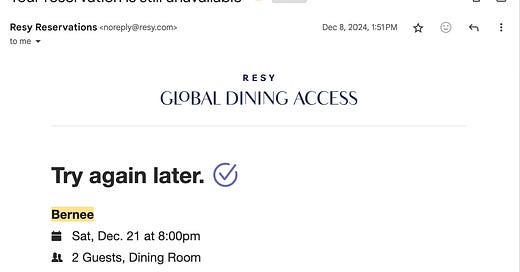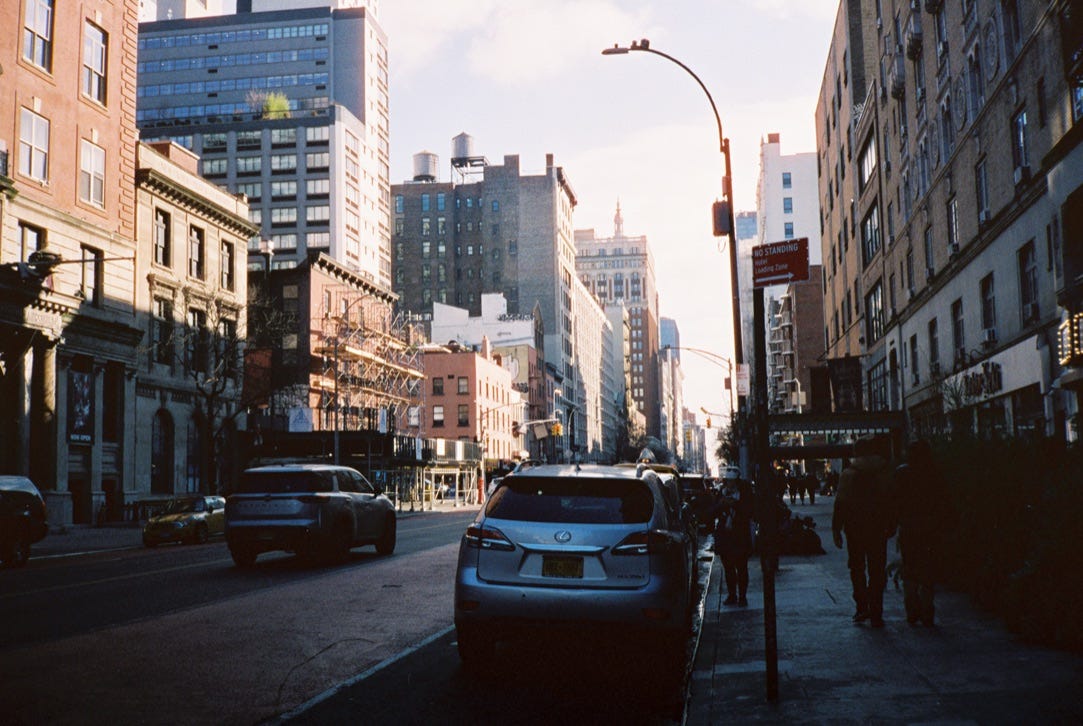The government isn’t saving you a table
The failed logic of New York’s reservation bill
A few friends got prime tables at New York restaurants from me as Christmas gifts. Calling ahead and paying for the meal itself is part of the present, but so is the reservation. A Friday night table at Estela using Amex’s Global Dining Access perk on Resy. An indulgent Torrisi seating via Dorsia early on a Thursday evening. A couple four tops that I texted front or back of house friends to help set up.
This is how the restaurant reservation game works, and how it will continue to work in spite of New York Governor Kathy Hochul’s empty PR grab via a bill this month that “prohibits third-party restaurant reservation services from arranging unauthorized restaurant reservations with food service establishments.” Some people pocket more than $70K a year by scooping up high-demand tables via diligent phone calls or simple bot-based scripts before posting them to sites such as Appointment Trader.
Hochul and allied restaurant association folks are touting their action against this reservation black market as an accomplishment. The Governor tweeted:
Making a restaurant reservation in New York shouldn’t feel like the Hunger Games. With the legislation I just signed, we’re giving everyone a fair chance to get a seat at the dinner table.
Assemblymember Alex Bores added this, according to Eater.
“New Yorkers should not have to pay shady middlemen just for the right to a dinner reservation. With this legislation, we are ensuring that families can celebrate a graduation, anniversary, or birthday without a $250, $500, or even $1,000 cover charge. We also protect restaurants from increased cancellations and protect workers from lost tips. A true win-win-win.”
Last-minute cancellations via unclaimed reservations from third-party sellers are bad and should be stopped. But the narrative around this celebratory circus is worse, reinforcing the roots of the government’s broken approach to the hospitality system and rewarding gross levels of consumer entitlement.
Here’s a breakdown of what’s actually happening, why New York State is getting this wrong, and the reasons I hope this doesn’t become a national trend.
No-show rates are unlikely to decrease. New York State Restaurant Association President Melissa Fleischut said in a statement that the cascading effect of bot-based cancellation is crippling to restaurants’ bottom lines. That’s true. But consider me deeply skeptical of the government’s ability and willingness to enforce this legislation. The Better Online Ticket Sales Act was made a federal law in 2016 to target bot-based concert ticket scalping. It has been applied in exactly one case. Seeing Taylor Swift has not gotten much easier, and securing a mediocre meal at Carbone will not become any more democratic now. The only thing that has reliably worked in the live events space is artists and venues with power wrestling back control, holding off on release timing or requiring an ID to match your tickets. To make a reservation in Korea this week, I had to have an app confirm my identity via a passport upload. Perhaps Major Food Group or Resy could take on this work themselves — more punishing cancellation fees, a greater ID-based barrier to entry, bot-blocking that would at least flummox the amateurs out there — but the juice isn’t worth the squeeze for them.
That’s because the Hunger Games comp is dumb. We’re talking about, like, 25 restaurants that are impossible to get into without connections. I’ll address that in a second, but I think it’s time that people accept they aren’t entitled to eat at a place simply because it exists. Yesterday afternoon, I took a look at tables for four in New York from 6-8pm today. Where could I theoretically set up a last-minute celebration without one of these famed cover charges and without making a phone call, sending a text or using some kind of acquired perk? Le Crocodile, HAGS, Yakitori Torishin, Eel Bar, Cafe Carmellini, Mission Chinese Food, Cafe Chelsea, Le Rock, Le Dive, Bar Blondeau, Atoboy, Chez Ma Tante, Corner Bar, Pebble Bar, Libertine, King, Koloman, Wildair, Craft, Tsukimi, Aska and Achilles Heel all had indoor availability. If you’re upset that you’re restricted from the top restaurant on the New York Times rankings or the food from a viral TikTok, just say that. But don’t act like the system is preventing customers from enjoying the local dining scene.
The 25 restaurants you can’t get into don’t want you there. The media is taking a hilarious approach to this story. Business Insider ran a headline stating: “Sorry, rich New Yorkers — there's no more legal black market for restaurant reservations.” Robb Report closed their recap with, “If you’re looking for a table at Carbone or Coqodaq in the near future, your chances of getting in may have just gotten a little bit better.” This is false. The rich and connected in New York will feel zero repercussions here. Bots do, of course, claim some of the tables at Tatiana and Via Carota. But more of those tables are just never released to the public. Instead, the restaurant reserves them for friends, regulars and celebrities who they know will act right and pay well. That’s good. Last-minute cancellations are bad, but so are five-tops that post more than they eat. If you don’t already have a relationship with the restaurant, there’s no way for them to know what kind of table you’re going to be. Dorsia helps solve for this with minimum spends and exclusive invites, while Blackbird better identifies and rewards regulars. They’re imperfect, sure, but they reduce risk. The crushing cost and debt accumulation that comes from opening a business with razor-thin margins means that if you do end up becoming one of these must-visit places, you have to take drastic steps to maximize your per check average. It’s gatekeeping, and it’s good.
It’s also dumb to look at the money in this secondary market and say the issue is that diners are getting screwed. Rather than helping restaurants find a way to realize that revenue, New York State goes for a hollow stunt targeting losers who pay $500 just for the ability to eat sandwiches they discovered on Instagram. There’s no saving those dudes. Meanwhile, chefs and general managers get into the restaurant business because they’re skilled at cooking food or providing service to diners. They quickly have to stop focusing on those things in order to handle schedules, spreadsheets, online stores, HR, paperwork, licenses, marketing and team logistics. They do all of this with impossible profit margins, wildly high time demands and not nearly enough government resources at their disposal. Creating and enforcing this scalper legislation but not cutting out red tape to facilitate more high quality, diverse, in-demand restaurants is a waste of time. The issue in this industry isn’t that it’s hard for a normal person to eat at Semma. It’s that regulations and costs make it impossible for there to be 15 more Semmas. That’s the real supply issue.
Governments and their tourism boards love to flaunt local restaurant scenes for their own gain, while ignoring what these businesses need to be successful. Do you think Top Chef is going from Wisconsin to Canada this season because they’re the best food destinations or because those governments rolled out the red carpet for Magical Elves? Investment is possible when the returns are immediate and obvious. Akira Akuto, the chef behind former LA favorite Konbi, gave an interview to Taste in August where he shared how American governments cripple new restaurants with opening delays, excessive permitting needs and high costs. (If you think all of these hoops are necessary for public safety, you should hang out in a kitchen before, during and after a health inspector visits). In other countries, you can open in a few days, with tax obligations that ramp up over time. That means you can slowly ease into smooth operations and take risks with the menu. The American system bends towards chains, expansions and sameness. That bend is a regulatory choice. It’s also why you see so many Italian joints and clubs with burgers & fries. There’s little room to play to anything but the lowest common denominator. And the number of must-visit restaurants with innovative points of view rather than the same $26 hamachi crudo declines.
If you’re upset about this, you can do something about it by being a better diner. You should probably just eat at 10 restaurants. Whatever 10 are nearby, interesting and in your budget. Visit them regularly and tip well. You’ll be able to get in whenever you want and you’ll get VIP service. If there aren’t 10 great restaurants near you and you care about this kind of thing, move or look harder. If you, like me, enjoy that rush of trying a brand new restaurant and having it blow your mind, just do the work to get in early. Accept that they’ll have some bumps in the road. Bet on a just-open local spot or a first location from a chef you love. Show up right at opening or swing by at the end of the night. Chat with the front of house staff. Bring Gatorades and candy for the kitchen. Make it your own destination rather than cribbing from a poorly dressed celebrity.
In a chapter on evolving restaurant trends from London’s The Book of St. John, the team writes, “Restaurants become part of the structure of a city, woven into the fabric of the wider community like a cinema or a pharmacy, attending to each need at every moment of need. While the restaurant’s rituals are daily, yours can be weekly or annual. You are still a regular.”
Not everyone can book reservations the way I did this week. They don’t have an Amex card or Dorsia access. They didn’t work in New York dining or foster friendships with people in that world. But that is not a problem these businesses need to solve, and it’s not a gap the government can close.
What you can do is be a good regular at the spots you want to see last. You can do it on your own terms and within your own budget. The payoff will be higher than the fleeting buzz of a forgettable 5:30 seating at The Corner Store, where they’ll just be waiting to flip your table.
Politicians promote toothless lies all the time. It’s part of the job. But spending resources on the smallest of PR victories around a treasured industry that needs saving is a particularly bad look. The best restaurants define their neighborhoods and cities better than almost any other local institutions. All this guised inaction does is push us closer to competing to get into the same Houston's. Godspeed.








Majority of this new breed of New Yorkers lack the balls to try to walk into restaurants. They're unable to tolerate a smidgen of uncertainty. I definitely understand not wanting to wait in line or not wanting to be disappointed by having to eat at your second choice, but if you really want to eat at Via Carota so badly...